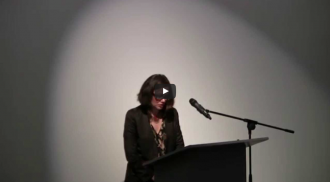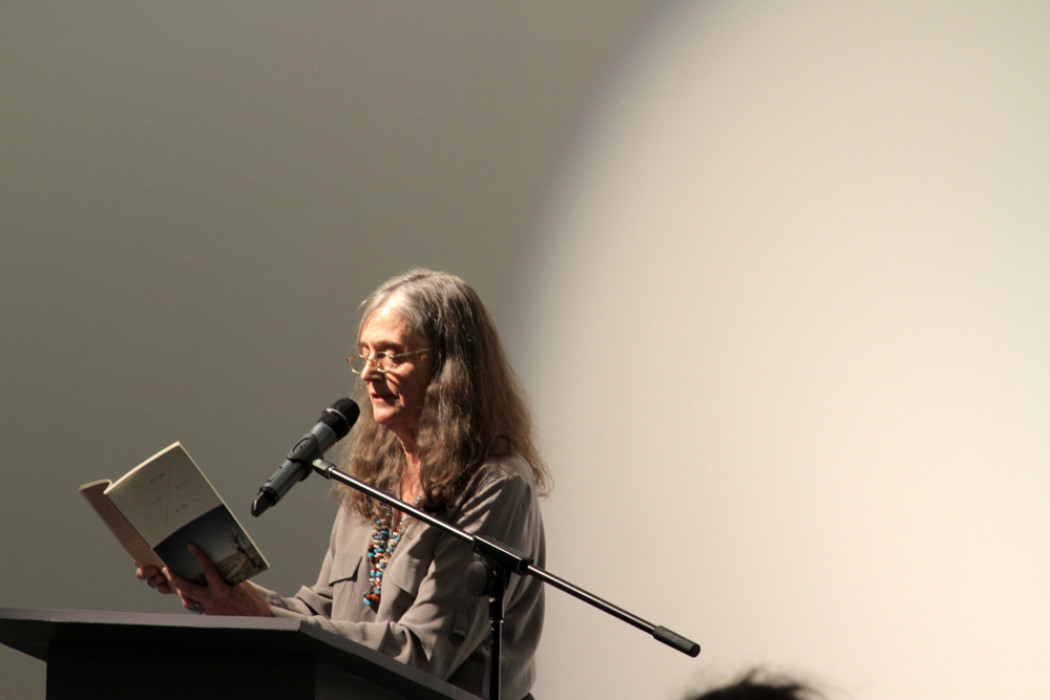Readings in Contemporary Poetry
Alice Notley and Brenda Coultas
Thursday, November 10, 2011, 6:30 pm, Dia Chelsea
Thursday, November 10, 2011, 6:30 pm
535 West 22nd Street, 5th Floor
New York City
Introduction by Vincent Katz
Alice Notley
Alice Notley has published over thirty books of poetry, including Culture of One, Reason and Other Women (2010) and Grave of Light, New and Selected Poems 1970-2005 (2006). With her sons, Anselm and Edmund Berrigan, Notley edited The Selected Poems of Ted Berrigan (2011) as well as The Collected Poems of Ted Berrigan (2005). She is also the author of a book of essays on poets and poetry, Coming After (2005). Notley is the recipient of numerous awards and prizes including the Academy of American Poets’ Lenore Marshall Prize and the Poetry Society of America’s Shelley Award.
CITY OF GHOSTLY FESTIVALS
Try to find
the center of night. this city
A hear break, I can’thearit.
Dido the appropriatedvictim
sets all the bottlesrattling
in the wind of ouragains.
I wanted a differentagain.
It’sdifferent.
_______________
The syllabary
ofmy
sins
a
thingMaat
flicks
into
the river
running
judgment
a million literalyears of.
I’msick of judgingyour carnage,
shesays,
you are all leftalone
withit.
_______________
Dido’s job
fortwothousandyears
has been to
commit suicide
after
herdeath, and after
the Romans destroy her
foundation.
_______________
The witch’s job. is to change
time
whichruns in short lines
between
eventslikeinnumerable
falls of cities
iswatching me. But itisn’t.
If you change the nature of
events
doyou change time?
Event: Isat down to
talk to everyone
whohadeverlived.
_______________
‘My country
isbroken and itcan’tbefixed’
timelovedso
femina-hating Rome
alwaysfalling
I, the witch, pardon no one
instead, I change Dido’s job.
_______________
Man withwhomeverythingis
boring
everythinghedoes and that one
doeswithhim
isboring. One iscondemned
tobe part of his
boring world.
There isanother man
withwhomone’scondemned
tobe
duplicitous
Everything’s a cheat a scam
in the big-guy road-house world
Help him tell lies. wearspecial
clothes
forthat.
_______________
THIS WAS HOW I BROKE IT
Theytold me I couldn’t have
it -- time -- so
I tookit.
I put him away
whohadwithered to a doll.
_______________
Weghoulswaitingoutside of time . . .
Dido to poem: Do all myremembering
now
so city continues.
Do weacceptitsaysvoice
He becametooold to bewise; we
had to stepoutsidehim
andintoknowledge
ofpoetry, the ghoulish, timeless state.
_______________
This poem, the poem,
always
my real country
the center of night. this city
A hear break, I can’thearit.
Dido the appropriatedvictim
sets all the bottlesrattling
in the wind of ouragains.
I wanted a differentagain.
It’sdifferent.
_______________
The syllabary
ofmy
sins
a
thingMaat
flicks
into
the river
running
judgment
a million literalyears of.
I’msick of judgingyour carnage,
shesays,
you are all leftalone
withit.
_______________
Dido’s job
fortwothousandyears
has been to
commit suicide
after
herdeath, and after
the Romans destroy her
foundation.
_______________
The witch’s job. is to change
time
whichruns in short lines
between
eventslikeinnumerable
falls of cities
iswatching me. But itisn’t.
If you change the nature of
events
doyou change time?
Event: Isat down to
talk to everyone
whohadeverlived.
_______________
‘My country
isbroken and itcan’tbefixed’
timelovedso
femina-hating Rome
alwaysfalling
I, the witch, pardon no one
instead, I change Dido’s job.
_______________
Man withwhomeverythingis
boring
everythinghedoes and that one
doeswithhim
isboring. One iscondemned
tobe part of his
boring world.
There isanother man
withwhomone’scondemned
tobe
duplicitous
Everything’s a cheat a scam
in the big-guy road-house world
Help him tell lies. wearspecial
clothes
forthat.
_______________
THIS WAS HOW I BROKE IT
Theytold me I couldn’t have
it -- time -- so
I tookit.
I put him away
whohadwithered to a doll.
_______________
Weghoulswaitingoutside of time . . .
Dido to poem: Do all myremembering
now
so city continues.
Do weacceptitsaysvoice
He becametooold to bewise; we
had to stepoutsidehim
andintoknowledge
ofpoetry, the ghoulish, timeless state.
_______________
This poem, the poem,
always
my real country
Brenda Coultas
Brenda Coultas’s publications include The Marvelous Bones of Time (2007), A Handmade Museum (2003), which won the Norma Farber First Book Award from The Poetry Society of America and a Greenwald grant from the Academy of American Poets, and Early Films (1996). She was a Distinguished Visiting Writer at Long Island University in 2009 and a New York Foundation for the Arts Fellow in 2005. Her poetry has been published in The Brooklyn Rail, Witness, Volt, and other journals.
_____from The Tatters
The feather this afternoon is a black and grey tongue pointing east. The pay phone, a portal through which voices connect in sometimes pleasing ways. The hood of the half booth as private as a homemade sex tape.
I, the relic on the street, born during the time of paper and print. My replacements, attached to wireless networks, ride herd down the sidewalk.
Holding close, slowing down to read the sign in the booth, tear off a tab of “I will post your flyers.”
University bus drives by: sadness ensues.
My days are spooked by the rotary ringtone of a cell phone ghosting a black enamel phone, heavy, and tethered to earth: that is a desk, that is gravity.
To open the folding door of the booth is to enter into a cabinet of curiosities: a carnival wagon. The rotary dial is a greased wheel of chance.
In airport corridors clusters of laptops and pay phones await flight. A stranger no longer taps on the glass.
Feathers are bits of bird. Eggs, an afterthought for this observer.
Once the neighbors played a recording of falling coins or stuck a pin into the receiver for free calls. This was in the past, although that is clear, I say it for myself before the time caught in the mirror turns amber.
Entering the carny wagon of childhood games: nickel pitch, shooting gallery, balloon burst, cranes/diggers, weight and age barkers. I prize gun-shaped cigarette lighters, girlie cards, switchblade combs, and stuffed bears. I do not prize plastic poodles. Now, I prize grainy vintage porn and airbrushed nudie calendars, or return to the flea market to gaze at a portrait of a bored couple in the 1920s posing with a headstone or a Chinese tea box full of loose sequins in rotting paper or a Buddha head a Vietnam vet souvenir or shreds of Nepali armor, or a Weimar Republic glossy of nightclub performers or journal, in English and Arabic. Translations of homilies. I bid on these tatters.
Separated coffee and milk at peace inside the cup on the street. Hard core cooing, brooding, in the back of the railroad apartment. A pillow propped against the boutique door. White wing spreads out from back of the locust tree.
Cup in the booth, finger streaks of Irish Rose on the walls.
Tintype of man with hand on his heart. My other hand is on the daguerreotypes. My eyes on a cloth monkey dressed in a suit and tie. My toes in my shoes and my hands at the ends of my arms.
The cup on top of the time machine makes a composition; What is a receiver? A cradle? What is “return?” The coin slot is a finger dip in into the dark.
Where are the cool blue mint hoods of Brazil?
“Mary had a little lamb,” were the first words.
The silver of the daguerreotype serves as my mirror. I’m building a time machine made from parts of the past, for when I might return through an old memory stored in wood.
I, the relic on the street, born during the time of paper and print. My replacements, attached to wireless networks, ride herd down the sidewalk.
Holding close, slowing down to read the sign in the booth, tear off a tab of “I will post your flyers.”
University bus drives by: sadness ensues.
My days are spooked by the rotary ringtone of a cell phone ghosting a black enamel phone, heavy, and tethered to earth: that is a desk, that is gravity.
To open the folding door of the booth is to enter into a cabinet of curiosities: a carnival wagon. The rotary dial is a greased wheel of chance.
In airport corridors clusters of laptops and pay phones await flight. A stranger no longer taps on the glass.
Feathers are bits of bird. Eggs, an afterthought for this observer.
Once the neighbors played a recording of falling coins or stuck a pin into the receiver for free calls. This was in the past, although that is clear, I say it for myself before the time caught in the mirror turns amber.
Entering the carny wagon of childhood games: nickel pitch, shooting gallery, balloon burst, cranes/diggers, weight and age barkers. I prize gun-shaped cigarette lighters, girlie cards, switchblade combs, and stuffed bears. I do not prize plastic poodles. Now, I prize grainy vintage porn and airbrushed nudie calendars, or return to the flea market to gaze at a portrait of a bored couple in the 1920s posing with a headstone or a Chinese tea box full of loose sequins in rotting paper or a Buddha head a Vietnam vet souvenir or shreds of Nepali armor, or a Weimar Republic glossy of nightclub performers or journal, in English and Arabic. Translations of homilies. I bid on these tatters.
Separated coffee and milk at peace inside the cup on the street. Hard core cooing, brooding, in the back of the railroad apartment. A pillow propped against the boutique door. White wing spreads out from back of the locust tree.
Cup in the booth, finger streaks of Irish Rose on the walls.
Tintype of man with hand on his heart. My other hand is on the daguerreotypes. My eyes on a cloth monkey dressed in a suit and tie. My toes in my shoes and my hands at the ends of my arms.
The cup on top of the time machine makes a composition; What is a receiver? A cradle? What is “return?” The coin slot is a finger dip in into the dark.
Where are the cool blue mint hoods of Brazil?
“Mary had a little lamb,” were the first words.
The silver of the daguerreotype serves as my mirror. I’m building a time machine made from parts of the past, for when I might return through an old memory stored in wood.
Explore
Alice Notley Audio from Readings in Contemporary Poetry
Move to Alice Notley Audio from Readings in Contemporary Poetry pageBrenda Coultas Audio, Readings in Contemporary Poetry
Move to Brenda Coultas Audio, Readings in Contemporary Poetry page
